EPISODE 421: STANLEY

POP CULTURE SPIRIT WOW
Hiya. Welcome back. Crazy week, huh? Theresa May and European elections and smug Australian prime ministers and Georgia and Game of Thrones’ conclusion and the New York Times is actually reporting on UFOs now (on the front page of its website, no less) and there were over 740 DUI arrests in the state of California in the first 40 hours of Memorial Day weekend (Wow) and God some day soon we're going to be dealing with daily insane quotes from Boris Johnson aren't we.
You might have noticed you’re getting this first thing Monday morning instead of Sunday night. That's on account of my good friend, Jet Lag.
Jet Lag: For when you need to fall asleep all at once at 9pm with the finality of turning off a light switch and then just as suddenly wake up in the very middle of the night. It's the friend that follows you home when you travel, and then just won't let you be. Jet Lag.
In the winter of 1999 I was working on the Pine Ridge Indian Reservation, when kind of out of the blue I came up with an idea for a script. I had no experience in screenwriting and before this point had no interest in it either, but I was at Mass one day, the Gospel was the story of the Prodigal Son, and all of a sudden there it was in me, this idea for a Prodigal Son story set on an Indian reservation, but about the other son (or in this case, daughter).
For months it wouldn’t let me go, and somehow I convinced my superiors to let me spend a summer at a Jesuit scholars’ community in Chicago trying to write it.
While I was there, I guess for inspiration, I decided to rewatch The Shining. And I was so blown away by it I kept watching itover and over. The story had nothing to do with my screenplay, and also it was a terrible idea insofar as it absolutely messed with my head. But I couldn’t help myself. Stanley Kubrick’s cinematography, the way his camera seemed to observe the action, as though it were itself the unseen, malevolent presence menacing the Torrance family, the effort he put into constructing every single shot, as though at each moment he had stopped to ask, What is the most interesting way to convey this frame? Or, what is the way that best conveys the feelings and conflicts of this moment? It was just so unlike anything I had ever seen. So much better than the movies I normally watched.
(Kubrick loves to use the center of frame, he understood the power of that space, the magnetism of it.


People in non-Panda animal costumes, man they freak me out.
And he loved to place the main characters front and center, too. And whereas with the scary creatures that centrality elevates their power, doing the same with the main characters emphasized both their own feelings of horror and also their powerlessness. Zoomed in so tight on them, we can’t see the things putting them in danger. Which makes them seem all the more vulnerable.
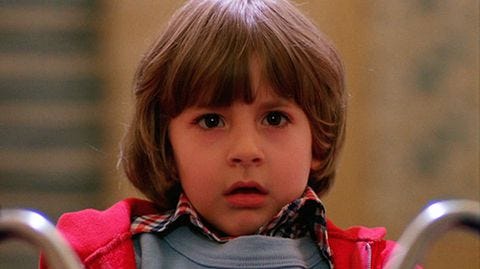
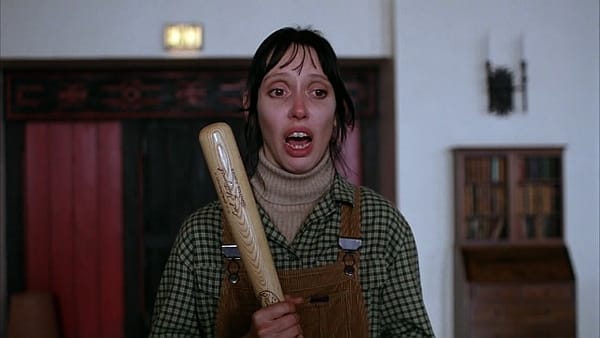
++
There’s not a lot of filmmakers before or since Kubrick that have taken the framing of a shot as seriously as he did.
One of my favorite contemporary exceptions is P.T. Anderson. If you’ve never seen Punch-Drunk Love, God you should. This moment, in which very anxious protagonist Barry is about to connect with the girl he loves Lena (which randomly has a song from Popeye sung by Shelley Duvall as the backing vocals) is one of my all-time favorites of cinema.
(It’s all about that flag…)
There’s also the incredible opening scene, which begins with Barry inexplicably in the very back of the screen’s space, cornered in exactly the way we’ll see he is by his many many sisters, followed by a sequence I don’t want to spoil that provides such a powerful experience of both the random terror and wonder of living in the world.
Probably I’m such a comic book fan at this point because comics are themselves (usually, anyway) a series of frames. Their power comes from both individual moments…

Such great echoes of the end of Empire in this cover shot from Darth Vader #3.
…and their progression….

From Mister Miracle #6;
imagine how different this feels if it ends after just the first image or the second.
…or their juxtaposition.
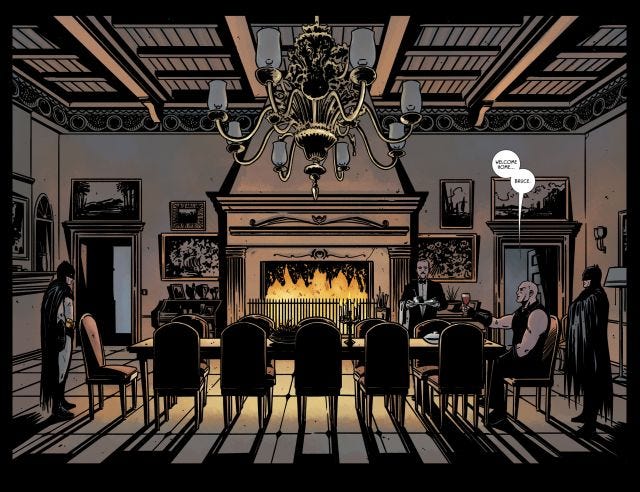

From the most recent issue of Batman, #71:
the first shot he's facing his enemies;
turn the page and he's in the same pose but facing his friends.
++
It’s been a long time since I thought about Stanley Kubrick. But this week on my way back from Hungary I stumbled upon this incredible Kubrick exhibit in London. The Museum of Design, which is in Kensington, gave each of his films its own room, complete with film clips, interviews with Kubrick and collaborators, various pieces from the sets, costumes or what not. It was unbelievable.
For The Shining, they had the typewriter, along with the pile of typed “All work and no play makes Jack a dull boy” manuscript sheets. And not just that: Kubrick being a world-renowned obsessive when it came to his films, he shot that manuscript reveal in five different languages because he wanted to make sure that it would have same level of impact.
And the words he chose for each were not an accurate translation of the same idea but an aphorism specific to that culture.

So here the Italian version is actually “The early bird catches the worm.” Which is really kind of perfect.
The German was “What you can do today, do not delay until tomorrow” and the Spanish “Not much early rises earlier”, meaning don’t rush to make decisions.
The museum also had this, which you know, was excellent:
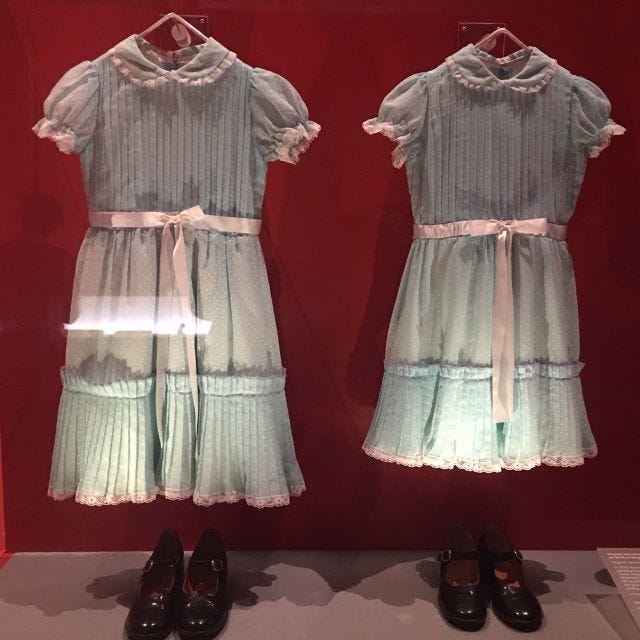
There were lots of fantastic quotes from Kubrick too. So for instance, rather than create his own stories, he liked to use pre-existing material – novels, short stories. And there was a quote from him explaining that he did that because it allowed him to experience the story for the first time like everyone else. The first time you read a story, he said, was like falling in love. “You never have that experience again with the story.”
He liked to play chess on set. On a busy, loud film set, he said, it’s hard to focus and easy to jump at the first thing that looks anywhere near right. “Chess teaches you to control the initial excitement you feel when you see something that looks good.”
And he refused outsiders on the set: “When you make a movie, it takes a few days just to get used to the crew, because it is like getting undressed in front of 50 people. Once you’re accustomed to them, the presence of even one other person on the set is discordant and tends to produce self-consciousness in the actors, and certainly in myself.” ++ Craftsmanship is such an interesting thing. Most things around us are fine. Designed for function. Ordinary. Fine.
But then when you come upon something where the designers decided fine was not good enough – whether it’s a coffee maker that is not only able to deliver coffee but is somehow gorgeous or it’s a movie where the director refuses to be happy with lots of talking head shots – it’s kind of incredible what it can do to us, how it invites us to release our grip on life a bit – a grip we didn’t know we were making (let alone quite so tightly) and just sort of surrender to the experience. At a very deep level I think an experience of great craftsmanship quietly tells us it’s okay, we can release the wheel and just savor, enjoy.
If you’re anywhere near London in the next few months, get to that exhibit. No matter what you love I think you will find something to inspire you.
Also, new Summer goal: Watch all of Kubrick’s films. And maybe PT Anderson’s as well. ++ (Did I just compare a Kubrick film to a self-driving Google car?
Wow. Talk about something you need to bring to your next confession.
I apologize to each of you, all of you, your descendants, Christiane Kubrick and the Kubrick estate and the Baby Jesus.) ++

++
Epilogue: At the end of that summer trying to write my first screenplay, I went to this big old house on a lake in the little town of Waupaca Wisconsin that Jesuits in Milwaukee often go to for some vacation in the summer. And after a month of The Shining, everything there – the mirrors in the rooms, the long empty hallways, the trees, the lakes, the darkness, windows – scared the crap out of me.
I had brought a camera with me and decided to turned my fears and obsession into a little horror movie of my own called Waupacko, about two young Jesuits who have to set up this big old mansion house by themselves in preparation for the summer’s guests, and one of the guys starts having all of these hallucinations of a young Jesuit in a cassock hiding in the mirrors and telling him to do terrible things.
I did my best to imitate Kubrick’s cinematography, but I could never quite make the spooky observer camera stuff work. I also definitely missed out on the opportunity to follow Kubrick’s enthusiasm for a good slow shot pushing in along our long dark hallways.
Still it was enormously satisfying to make a film that captured my own experience of that big scary house. It’s unbelievable how scary the windows are at night when you’re out alone in a forest. And I don’t know what it was about the mirrors at this place but I was constantly afraid to look into them.
In the end the guy having these hallucinations fights them off as best he can, but eventually he loses all touch with reality and beats the other Jesuit to death with a golf club.
Afterwards the Jesuit who gets killed came up to me. “Are you okay?” he said, accusingly.
When I told him I was fine, more than fine in fact he just stared at me. “I don’t think you are.”
Ah well. Art, always in the eye of the beholder. ++ Speaking of things beheld, here are some of my favorite responses to the finale of Game of Thrones.

(And you thought Brienne was a Samantha.)


(This meme is even more satisfying in the mouth of Packers' quarterback Aaron Rodgers.)


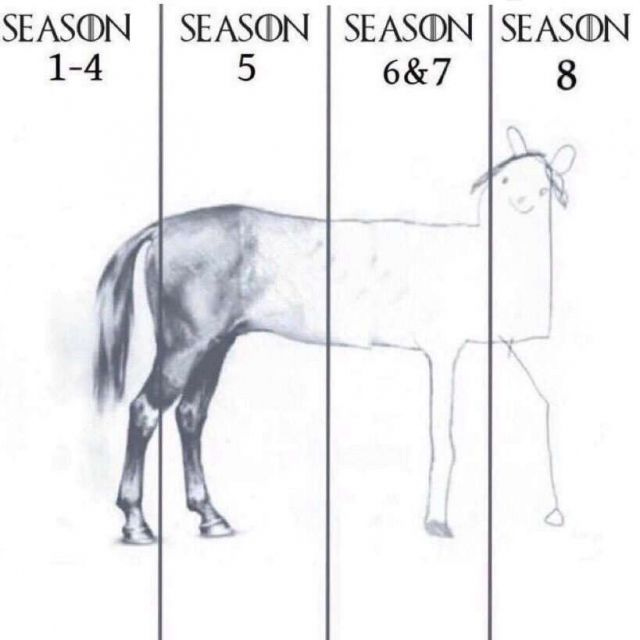
Personally I found the ending a largely meta experience, less an end to the story than the writers trying to say Important Things, like “Seriously you guys, Dany really was bad all the time” and “Storytellers are awesome, aren't they (ahem)?” (That Tyrion speech about the magic of stories was bonkers.)
Every story is a magic trick, a bit of sleight of hand that we fall for again even after we’ve already seen them do it. Even to its end Thrones has done a pretty tremendous job of fooling us (or me, anyway). But this last season --and last couple episodes especially – you could also see the creators palming the coin. And when your bread and butter is illusion, that’s a problem.
But I feel like you’ve heard enough from me about Thrones here. If you should want more, I wrote a last piece on it for America, which at its best let me write about Davos Seaworth, my favorite character who is not Arya or Brienne. It also gave me a chance to say something I’ve been feeling about the church (namely, our politics is all about the same games and they are killing us).
I’ve also just begun to reread the first Thrones novel. Don’t look at me like that, I don’t have a problem letting go, it’s just really good. So much better than the show. ++ LINKS ++ This scene cut from The Last Jedi encapsulates everything that I loved about The Last Jedi and also I think all that some others hated about it.
Deadwood comes back for one last episode next weekend! Vulture has a great interview with Ian McShane about it, and also this piece about creator David Milch, who now has the beginning of Alzheimer’s.
Vulture also did this oral history of Thrones from the perspective of the extras. Which is an outstanding idea and has fun reveals like the fact that the Night’s Watch was mostly biker dudes and the Wildling actors were encouraged to stay as dirty (and stinky) as they could.
And the song getting me through this week, which kind of says it all.
Sigh not so and let them go, my friends. Be you blithe and bonnie.
See you next week.

